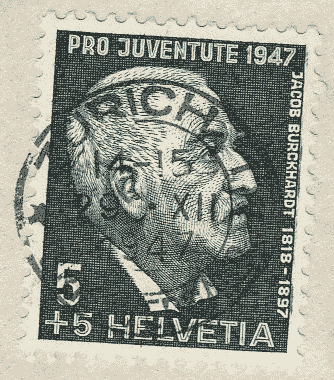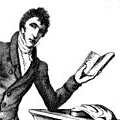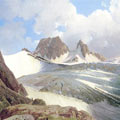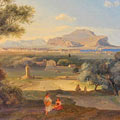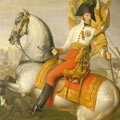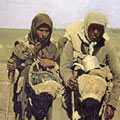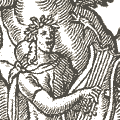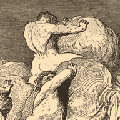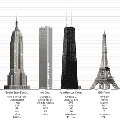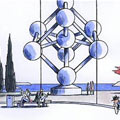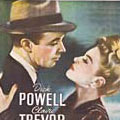Nadat Friedrich Nietzsche in januari 1889 in Turijn op straat in elkaar was gezakt, ontving de kunsthistoricus Jacob Burckhardt in Bazel een vreemd briefje dat begon met de woorden: “Beste professor, veel liever was ik hoogleraar in Bazel dan God…“ De geschrokken professor bracht onmiddellijk zijn collega Franz Overbeck op de hoogte van het vreemde briefje van hun gemeenschappelijke vriend. Toen Overbeck kort daarop zelf ook een verwarde brief van Nietzsche kreeg, reisde hij onmiddellijk naar Turijn. Daar aangekomen bleek dat Nietzsche in de waanzin was beland. De briefjes aan zijn Bazelse vrienden zijn als wahnsinnszettel de geschiedenis ingegaan.
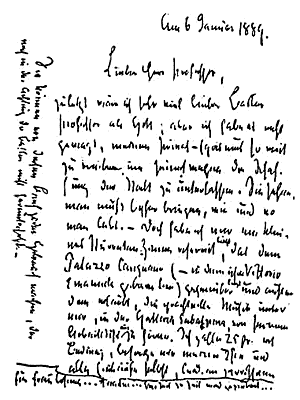
Lieber Herr Professor, zuletzt wäre ich sehr viel lieber Basler Professor als Gott, aber ich habe es nicht gewagt, meinen Privat-Egoismus so weit zu treiben, um seinetwillen die Schaffung der Welt zu unterlassen. Sie sehen, man muß Opfer bringen, wie und wo man lebt (…)
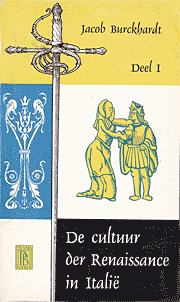 Burckhardt en Nietzsche waren jarenlang met elkaar bevriend geweest. Toen de 24-jarige Nietzsche in 1869 als hoogleraar een leerstoel in Bazel kreeg, leerde hij de 26 jaar oudere Burckhardt en de 7 jaar oudere Overbeck kennen. Burckhardt doceerde in Bazel geschiedenis en kunstgeschiedenis en was al een beroemdheid door Die Kultur der Renaissance in Italien (1860), zijn uitgebreide studie over de Italiaanse Renaissance. Overbeck doceerde er theologie. Met Burckhardt deelde Nietzsche in het begin van de jaren zeventig zijn kritiek op de materialistische kleinburgerlijke cultuur. In 1849 had Burckhardt al geschreven dat hij materialistische kleinburgers verachtte, maar dat zij een minder groot gevaar vormden dan “misplaatste genialiteit.“
Burckhardt en Nietzsche waren jarenlang met elkaar bevriend geweest. Toen de 24-jarige Nietzsche in 1869 als hoogleraar een leerstoel in Bazel kreeg, leerde hij de 26 jaar oudere Burckhardt en de 7 jaar oudere Overbeck kennen. Burckhardt doceerde in Bazel geschiedenis en kunstgeschiedenis en was al een beroemdheid door Die Kultur der Renaissance in Italien (1860), zijn uitgebreide studie over de Italiaanse Renaissance. Overbeck doceerde er theologie. Met Burckhardt deelde Nietzsche in het begin van de jaren zeventig zijn kritiek op de materialistische kleinburgerlijke cultuur. In 1849 had Burckhardt al geschreven dat hij materialistische kleinburgers verachtte, maar dat zij een minder groot gevaar vormden dan “misplaatste genialiteit.“
Burckhardt regards the interest in competition as part of the Aristocratic culture. It also existed in democratic Athens, and was the source of its great achievements. The attitude of the great democratic leader Pericles to Athens power in Greece itself shows this. However, the democratic world undermined competition. Excellence and the competition for excellence became the kind of jealousy and urge to denunciation, which led to the trial and death of Socrates. Athens after the Peloponnesian War weakened under the influence of this kind of spirit in which demogogary, perjury, and parasitic law cases became dominant. Here we see why Plato preferred Crete and Sparta. However, Sparta itself lost its old civic virtues at this, according to Burckhardt, becasue its very somination of Greece made it weaken under the influence of the other parts of Greece.
For Burckhardt, democracy means an individualism based on the cult of excellence and the growth of resentment. The decline of the aristocracy which vreated the values used by democracy allows great culture to flourish, but only for a limited period. These aspects of Burckhardt are close to Nietzsche’s thoughts on politics and culture throughout his life, and should be taken into account.
Bron: stockerb.wordpress.com
